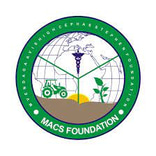
Lasting Change
Discover how the MACS Foundation is driving lasting change by empowering communities through mechanized agriculture, climate resilience, clean energy transition, and improved healthcare systems. This post explores impactful strategies for food security, environmental sustainability, and health security to build a resilient future for all.
THE MACS FOUNDATION
3/31/20253 min read


Lasting Change: Creating Impactful Programs to Empower Communities for Future Resilience
In the face of pressing challenges in agriculture, climate change, and health security, the path to a resilient future requires intentional and sustainable action. The MACS Foundation is committed to fostering long-term change by empowering communities through education, training, and advocacy in key sectors. Through integrated programs that address agriculture, environmental sustainability, and healthcare, we can build a society that thrives despite evolving global and local challenges.
Mechanised and Climate-Resilient Agriculture: A Pathway to Food Security
Agriculture remains the backbone of Nigeria’s economy, employing over 70% of the population. However, low mechanisation levels, climate-related challenges, and land degradation threaten food security and economic stability. By embracing mechanisation and climate-smart practices, Nigeria can modernise its agricultural sector while ensuring sustainability.
Key Strategies for Agricultural Transformation
Increasing Mechanisation: Nigeria’s mechanisation rate is significantly below the FAO recommendation. Expanding access to tractors, harvesters, and processing equipment will enhance efficiency and productivity.
Enhancing Climate Resilience: Investing in drought-resistant crops, irrigation systems, and sustainable water management will help farmers adapt to changing climate conditions.
Promoting Sustainable Farming: Encouraging agroforestry, crop rotation, and organic fertilisers can restore soil health and boost long-term yields.
Expected Impact
Food Security: Higher productivity will ensure food availability for Nigeria’s growing population.
Economic Growth: Job creation in equipment operation, sales, and agro-processing will drive rural development.
Climate Adaptation: Resilient farming practices will reduce deforestation, desertification, and greenhouse gas emissions.
A notable example is Nigeria’s Green Imperative Project, a collaboration with Brazil to deploy mechanisation hubs and train farmers, setting a model for integrating technology and sustainability in agriculture.
A Sustainable Environment: Addressing Climate Change and Clean Energy Transition
Environmental sustainability is crucial for Nigeria’s future, as climate change threatens agriculture, infrastructure, and livelihoods. A strategic shift toward climate security and clean energy is vital for reducing vulnerabilities and ensuring long-term resilience.
Core Areas of Environmental Sustainability
Climate Change Mitigation: Reforestation efforts, renewable energy promotion, and strict enforcement of climate policies can help combat environmental degradation.
Climate Security: Reducing resource-based conflicts through sustainable land-use practices and climate education can enhance peace and stability.
Clean Energy Transition: Expanding solar, wind, and hydroelectric projects will improve energy access while reducing reliance on fossil fuels.
Benefits of Sustainable Initiatives
Environmental Protection: Less deforestation, improved air quality, and conservation of biodiversity.
Economic Opportunities: Green jobs in renewable energy and climate-smart industries.
Social Stability: Reduced conflicts over land and water resources, fostering community resilience.
Successful initiatives like the Solar Power Nigeria Program and the Great Green Wall Initiative demonstrate how investments in renewable energy and afforestation can drive sustainable development in Nigeria.
Building a Healthy Society: Strengthening the Health Value Chain
A strong healthcare system is fundamental to national development. By improving infrastructure, workforce capacity, and health security measures, Nigeria can ensure equitable and accessible healthcare for all.
Key Areas of Focus
Enhancing Healthcare Infrastructure: Upgrading primary health centers and investing in modern medical equipment will improve service delivery, especially in rural areas.
Strengthening the Healthcare Workforce: Expanding training programs and providing incentives for medical professionals will bridge gaps in service delivery.
Improving Health Security: Strengthening disease prevention, expanding immunization programs, and ensuring universal health coverage will protect communities from health crises.
Expected Benefits
Better Health Outcomes: Reduced maternal and child mortality, increased life expectancy, and improved disease management.
Economic Productivity: A healthier workforce leads to national development and reduced economic burdens from preventable diseases.
Resilience to Health Emergencies: Robust healthcare systems can effectively respond to pandemics and other health crises.
MACS Foundation: Driving Lasting Change
The MACS Foundation is dedicated to empowering communities through structured programs and advocacy in health, environmental conservation, and agriculture. Our key objectives include:
Conducting education and training initiatives to enhance skills in critical sectors.
Raising awareness about sustainable practices and their benefits.
Implementing projects to address pressing challenges in health, environment, and agriculture.
Collaborating with stakeholders for a broader impact and effective policy advocacy.
Ensuring continuous program evaluation for sustained improvement.
Conclusion
The path to lasting change lies in strategic interventions that empower communities with knowledge, tools, and resources for a sustainable future. By integrating mechanised agriculture, climate resilience, clean energy transition, and robust healthcare systems, Nigeria can build a future that is food-secure, environmentally sustainable, and health-conscious. The MACS Foundation remains committed to being a driving force in this transformative journey, ensuring that communities are equipped to thrive today and in the future.

Impact
Empowering communities for a sustainable future together.
Join
Act
macsfoundation2022@gmail.com
contact@macsfoundation.org
+234-803-614-8177
+234-802-050-6099
© 2025. All rights reserved.
Quick Links
Adress
Suite1 The Partners Mini Mall, #1 Fortress Avenue, Da' Fortress Estate, Piya Kassa Lugbe, FCT, Abuja
